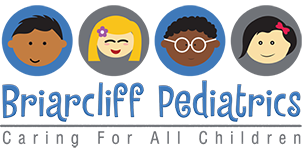Common Questions from New Parents
- On Dec, 31, 2018
- Doctor Notes
- Latest News, Well Child
 As experienced pediatricians, we get all sorts of questions from people who have recently had their first child. When researching best parenting practices, many people get understandably overwhelmed. There seems to be an endless amount to know about rearing children, and no matter how well you prepare, you’ll inevitably encounter unexpected issues. To help new parents better prepare for the many, many questions that are bound to come up in their baby’s first few months, we’re starting a new series of blogs specifically for those new parents. Today, we’re addressing two of the most common questions new parents ask:
As experienced pediatricians, we get all sorts of questions from people who have recently had their first child. When researching best parenting practices, many people get understandably overwhelmed. There seems to be an endless amount to know about rearing children, and no matter how well you prepare, you’ll inevitably encounter unexpected issues. To help new parents better prepare for the many, many questions that are bound to come up in their baby’s first few months, we’re starting a new series of blogs specifically for those new parents. Today, we’re addressing two of the most common questions new parents ask:
When is it safe to take my newborn baby out in public?
Though somewhat commonly held, the idea that newborns need to stay at home is incorrect. This misconception may come from the fact that, for the first six-to-eight weeks of life, babies should remain in well ventilated areas. This means you should try to stay away from malls, subway stations, mosh pits, etc. when you’re out with your new baby, but he or she will probably be fine if you must take him or her on the bus every now and then. Just make sure that your child’s vaccinations are up to date and that anyone who touches him or her washes their hands first.
Fresh air can be great for infants, as long as they’re healthy, and you take certain precautions. First, make sure you don’t overdress or underdress your infant, so that he or she doesn’t get too hot or too cold. Second, we strongly recommend keeping your baby out of direct sunlight when he or she is outdoors. A newborn’s skin is extremely delicate, and skin damage from sunlight so early in life can increase an infant’s lifelong risk of developing skin cancer. While you’re making an effort to protect your child’s skin from the sun, take the time to protect your own skin as well. And again, try to avoid large, dense crowds when you’re with your newborn, as these types of environments increase the risk of coming into close contact with someone who’s sick. Because infants have immature immune systems, it’s best to limit this possibility in early life. Furthermore, excessive noise and bustle can create unnecessary stress for your child.
How often should I feed my newborn?
Schedule-wise, there are a few different approaches a parent can take to feeding his or her baby. Many simply wait until their child indicates that he or she is hungry, allowing the baby’s natural hunger cycle to dictate their feeding schedule. This approach is sometimes called “demand feeding.” An infant may lean toward their bottle or mother’s breast, suck on their hands or fingers, pucker their lips, stick out their tongue, open their mouth, become fussy, or (of course) cry when they’re ready to eat.
Every child is unique, so each will get hungry at slightly different intervals. Babies digest breast milk more quickly than they digest formula, so how often they get hungry will vary, depending on which one they drink. A normal feeding schedule for a baby who’s breastfeeding is roughly every 1½ to 3 hours, whereas a baby who’s drinking formula will probably get hungry every 2 to 3 hours. A normal, healthy feeding rate for newborns up to a month old is 8-12 times per day, decreasing to 7-9 times per day after that. As he or she grows, your newborn will be able to go longer without eating and start getting hungry in an increasingly predictable pattern.
Dr. Ray Deeb and Dr. Ashley Brown provide comprehensive healthcare for newborns and children up to the age of 18, and they’re currently accepting new patients. If you have questions of your own or would just like to learn more about our practice, contact Briarcliff Pediatrics to schedule an appointment or a complimentary meet-and-greet. Don’t forget to follow us on Facebook and Instagram to get the latest health tips and news in children’s healthcare, and check back often for new blogs.




